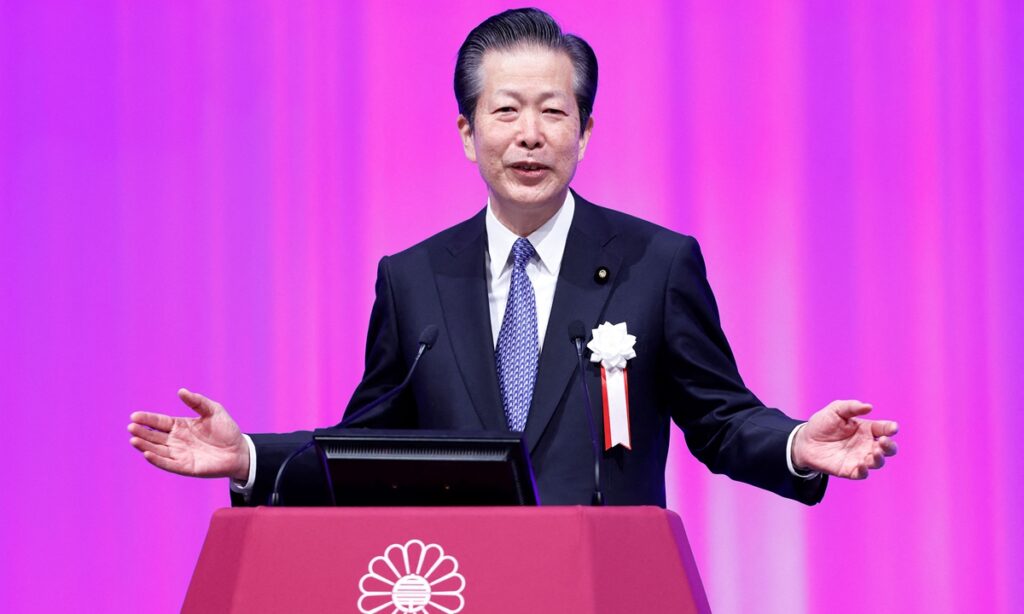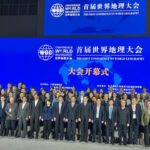After more than three years, the leader of Japanese junior coalition partner Komeito is reportedly eyeing visiting China to exert influence on improving China-Japan relations, which have deteriorated in recent years due to hot-button issues including the Diaoyu Islands and the Taiwan question.
In another positive signal for bilateral relations after talks between Chinese and Japanese leaders earlier this month in Thailand, if this journey can be made, Chinese observers believe the Japanese party leader could have more detailed exchanges with Beijing in managing differences on issues of concern to both countries and expanding cooperation in various fields, and can serve as a bridge to warm ties between Beijing and Tokyo.
Japanese media outlet Kyodo News on Saturday cited sources as saying that in a meeting with Chinese Ambassador to Japan Kong Xuanyou in mid-November, Komeito chief Natsuo Yamaguchi expressed his hope to visit China before the opening of the ordinary parliamentary session in January.
One day after Chinese President Xi Jinping met with Japanese Prime Minister Fumio Kishida for the first time in Thailand on the sidelines of the APEC Economic Leaders’ Meeting on November 17 at a time when bilateral relations are facing a slew of challenges, Yamaguchi said at a party conference that the meeting was a big step for bilateral ties, and that he hopes it will help promote non-governmental exchanges as well as exchanges between political parties in the future, Kyodo reported on November 18.
Komeito, widely regarded as a pacifist party, has built a long-term friendship with China. According to media reports, it sent the first delegations to China before the normalization of diplomatic relations between China and Japan in 1972, which was considered as paving the way for the signing of the bilateral joint statement. Afterwards, senior leaders of Komeito actively visited China.
In September 2018, China’s top political advisor Wang Yang met with a delegation from Komeito led by Yamaguchi in Beijing where Yamaguchi delivered a letter from the then Japanese prime minister Shinzo Abe to Xi, the Xinhua News Agency reported.
This time, however, Komeito’s attempt to improve relations with China may encounter opposition from conservative forces and some members of the Japanese ruling Liberal Democratic Party (LDP), Japanese media said.
In the past three years, the relationship between China and Japan has taken a turn for the worse due to the interruption of exchanges since the COVID-19 pandemic, the interruption of the “summit diplomacy” between the two countries, and the intensification of competition between China and the US. Not only has the dispute between the two countries over the Diaoyu Islands intensified, but also tensions over the Taiwan question have been hyped by Japanese conservative forces, which severely compressed the space for cooperation between China and Japan, observers said.
Lian Degui, director of the Department of Japanese Studies at Shanghai International Studies University, told the Global Times on Sunday that given that Komeito is the coalition partner of Japan’s ruling Liberal Democratic Party, sending a delegation to China will represent not only the party itself but also the Japanese government, which is expected to further consolidate the five-point consensus on stabilizing and developing bilateral relations reached by Xi and Kishida during the recent meeting.
A potential visit by Yamaguchi could serve as a bridge between Beijing and Tokyo to warm bilateral ties, Lian noted.
Komeito has been more active in engaging in exchanges with China. According to newspaper Mainichi Shimbun, the party does not deny that the security environment around Japan is becoming more severe due to China’s rise, especially at a time of tension over the Taiwan Straits, but the party believes that it will lose the channel of dialogue with China by saying that China is a “threat.” Media reports revealed that Tokyo is considering updating the National Security Strategy to emphasize the threats from China and Russia by the end of 2022.
Although the Japanese government has turned more conservative and provoked China more intensively, experts said that taking the potential Komeito visit as an opportunity would be crucial to maintaining a good atmosphere for communication and exploring cooperation potential, while drawing clear red lines on matters concerning China’s core interests.
On Sunday, Wang Guoqing, former vice-minister of the State Council Information Office, expressed his hope at a seminar on China-Japan friendship and historical responsibility that through mutual visits of scholars, youth exchanges and project research, the two countries could strengthen cooperation in more areas, and gradually form a chorus of friendship between the two peoples, making positive contributions to the cause of friendship between the two countries.
(Global Times)




